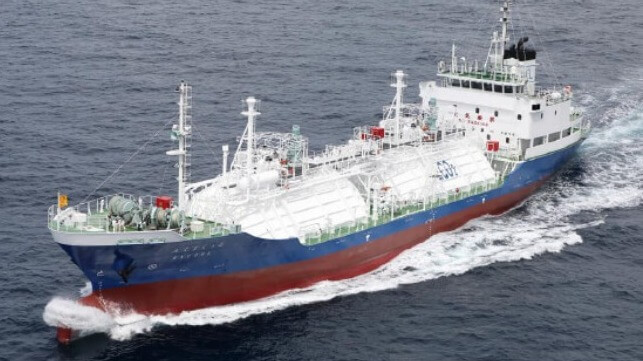Japan Completes Construction of First Demonstration LCO2 Transport Vessel

A Japanese R&D project for liquid carbon dioxide transportation has completed the construction of the first vessel designed for transportation as part of the plans for carbon capture and storage. The project addressed key challenges in designing the vessel and the containment systems and now plans to explore transportation and safe operations to lay the groundwork for the use of large LCO2 transport vessels. The Japanese government expects that carbon capture, transport, and storage will become fully operational by 2030 playing a key role in the country’s efforts to achieve net zero carbon emissions.
Named the EXCOOL, the 1,290 dwt vessel was built by Mitsubishi Shipbuilding. The christening and handover ceremony took place today at the Shimonoseki Shipyard. The vessel is owned by Sanyu Kisen Kaisha, a Kobe-based ship management company, and is being chartered to Nippon Gas Line for the demonstration project.
The project was launched by Japan’s New Energy and Industrial Technology Development Organization (NEDO) in June 2021 and they report having overcome key challenges in developing the technologies for liquified CO2 marine transport. Ochanomizu University studied the physical properties of CO2 under non-equilibrium conditions and the dry-ice phenomenon during marine transport. The Engineering Advancement Association (ENAA) of Japan expanded on initial research from NEDO, which had been studying the conceptual designs for CO2 transport since 2008. Nippon Gas, K Line (Kawasaki Kisen Kaisha), and Mitsubishi Heavy Industries also contributed their experience in gas transport.

EXCOOL was handed over to the demonstration project which will use it to develop transport technologies (MHI)
The vessel was built with a tank, equipment, and handling system designed by ENAA. Construction of the vessel began in October 2022 and it was launched in March 2023. The completed vessel is 236 feet in length and has a cargo tank capacity of 1,450 cubic meters.
In the next phase of the demonstration project, the EXCOOL will be used to test the loading and transport of LCO2 to establish a technology for the large-volume and long-distance marine transport of liquefied CO2. Through the use of the vessel, they expect to improve the efficiency of transporting CO2 from capturing sites to remote storage sites.

that matters most
Get the latest maritime news delivered to your inbox daily.
ENAA will continue to be responsible for the planning, analysis, and supervision of the demonstration tests. K Line has helped to prepare an operating manual by conducting a risk assessment of the EXCOOL and will continue to contribute to the establishment of safe operation technology and analysis of the operations.
Japan’s demonstration project is proceeding as efforts are also underway to launch the first commercial CO2 transport and storage project. Northern Lights, a joint venture between Equinor, Shell, and TotalEnergies, ordered LCO2 carrier vessels which are being built in China at Dalian Shipbuilding Industry Co. (DSIC). Ordered in late 2021, the first two vessels are under construction and due for delivery in 2024. These ships will be 426 feet long and have a capacity of 7,500 cbm of CO2. Northern Lights recently contracted for a third vessel also to be built at Dalin as the company moves forward towards its start of commercial operations.
